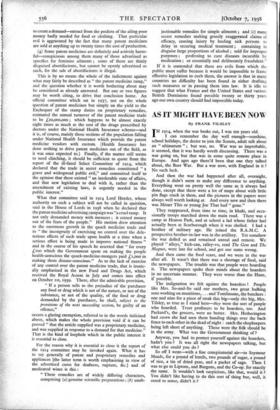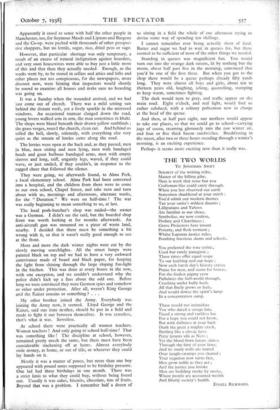AS IT MIGHT HAVE BEEN NOW
By FRANK TILSLEY
IN 1914, when the war broke out, I was ten years old. I can remember the day well enough—sunshine, school holidays, the desire to join the Scouts, adult talk about an " ultimatum " ; but war, no. War was so improbable, it seemed, that it was hardly worth discussing. There was a war going on, but that was in some quite remote place in Europe. And ages ago there'd been that one they talked about, the Boer War. But a war now, with England in it ? No such luck.
And then the war had happened after all, overnight, though it didn't seem to make any difference to anything. Everything went on pretty well the same as it always had done, except that there were a lot of maps about with little pin flags stuck in them, and the pictures in the papers were always well worth looking at. And every now and then there was Mister This or young Joe That had " gone."
They reappeared, from time to time, in khaki, and occa- sionally troops marched down the main road. There was a camp at Heaton Park, and at school a lad whose father had actually been at Scarborough when it was shelled. I had a brother of military age. He joined the R.A.M.C. A prospective brother-in-law was in the artillery. Yet somehow the war defied us and remained unreal and remote. We played " alleys," kick-can, ralley-vo, read The Gem and The Magnet, were late for school, and got our sums wrong.
And then came the food scare, and we were in the war after all. It wasn't that there was a shortage of food, said the newspapers. The trouble was that people were hoarding it. The newspapers spoke their minds about the hoarders in no uncertain manner. They were worse than the Hum, if possible.
The indignation we felt against the hoarders ! People like Mrs. So-and-So said our mothers, two great hulking sons working on munitions, . . . and Tomlinsons, the butchers : one and nine for a piece of steak this big—only this big, Mrs. Tilsley, as true as I stand here—they were the sort of people who hoarded. Trust profiteers to be hoarders, too. And Packard's, the grocers, were no better. Mrs. Hetherington had sworn she had seen them handing things over the back- fence to each other in the dead of night : catch the shopkeepers being left short of anything. Those were the folk should be in the army. What was the Government thinking of ?
Anyway, you had to protect yourself against the hoarders, hadn't you ? It was all right the newspapers talking, but what else could you do ?
So off I went—with a fine conspiratorial air—to Seymour Meads, for a pound of lentils, two pounds of sugar, a pound of rice, a tin of dried peas, and a packet of sago. Then I was to go to Liptons, and Burgons, and the Co-op. for exactly the same. It wouldn't look suspicious, like that, would it ? You didn't like having to do this sort of thing but, well, it stood to sense, didn't it ? Apparently it stood to sense with half the other people in Manchester, too, for Seymour Meads and Liptons and Burgons and the Co-op. were packed with thousands of other prospec- tive shoppers, but no lentils, sugar, rice, dried peas or sago.
However, that particular shortage was only temporary, a result of an excess of natural indignation against hoarders, and very soon housewives were able to buy just a little more of this and that than they actually needed. Enough, as the weeks went by, to be stored in cellars and attics and lofts and other places not too conspicuous, for the newspapers, more discreet now, were hinting that inspectors would shortly be round to examine all houses and make sure no hoarding was going on.
It was a Sunday when the wounded arrived, and we had just come out of church. There was a mild setting sun behind the distant roofs, yet a lively sparkle in the mirrored windows. An occasional tramcar clanged down the road, young lovers walked arm in arm, the man sometimes in khaki. The shops were bland beneath their drawn yellow sunblinds ; the grass verges, round the church, clean cut. And behind us tolled the bell, slowly, solemnly, with everything else very quiet as the stream of lorries came along the road.
The lorries were open at the back and, as they passed, men in blue, men sitting and men lying, men with bandaged heads and great bulbous bandaged arms, men with empty sleeves and long, stiff, ungainly legs, waved, if they could wave, or just smiled, if they couldn't, in response to the ragged cheer that followed the silence.
They were going, we afterwards found, to Alma Park, a local elementary school. Alma Park had been converted into a hospital, and the children from there were to come to our own school, Chapel Street, and take turn and turn about with us, mornings and afternoons, alternate weeks, for the " Duration." We were on half-time ! The war was really beginning to mean something to us, at last.
The local pork-butcher's shop was raided—the owner was a German. I didn't see the raid, but the boarded shop front was worth looking at for months afterwards. An anti-aircraft gun was mounted on a piece of waste land, nearby. I decided that there must be something a bit wrong with it, so that it wasn't really good enough to use at the front.
More and more the dark winter nights were cut by the slowly moving searchlights. All the street lamps were painted black on top and we had to have a very awkward contrivance made of board and black paper, for keeping the light from shining through the large sloping fan-light in the kitchen. This was done at every house in the row, with one exception, and we couldn't understand why the police didn't kick up a fuss about the odd one. Before long we were convinced they were German spies and somehow or other under protection. After all, weren't King George and the Kaiser cousins or something ? . . .
My other brother joined the Army. Everybody was joining the Army now, it seemed. Lloyd George and the Kaiser, said one irate mother, should be put in a field and made to fight it out between themselves. It was senseless, that's what it was. Senseless.
At school there were practically all women teachers. Women teachers ! And only going to school half-time ! That was something like ! The discipline at school, however, remained pretty much the same, but there must have been considerable slackening off at home. Almost everybody stole money, at home, or out of tills, or wherever they could lay hands on it.
Mostly it was a matter of pence, but more than one boy appeared with pound notes supposed to be birthday presents. One lad had three birthdays in one month. There was a strict limit to what they could buy, without being found out. Usually it was cakes, biscuits, chocolate, tins of fruits. Beyond that was a problem. I remember half a dozen of us sitting in a field the whole of one afternoon trying to devise some way of spending ten shillings.
I cannot remember ever being actually short of food. Butter and sugar we had to wait in queues for, but there seemed to be sufficient of most of the other things we needed.
Standing in queues was magnificent fun. You would turn out into the strange dark streets, lit by nothing but the moon, about half past five in the morning, convinced that you'd be one of the first there. But when you got to the shop there would be a queue perhaps already fifty yards long. They were almost all boys and girls, about ten to thirteen years old, laughing, joking, quarrelling, stamping to keep warm, sometimes fighting.
The dark would turn to grey, and traffic appear on the main road. Eight o'clock, and real light, would find us rather subdued, with a solitary policeman now in charge at the head of the queue.
And then, at half past eight, our mothers would appear to take our places, so that we could go to school—carrying jugs of cocoa, steaming gloriously into the raw winter air, and four or five thick bacon sandwiches. Breakfasting in the street, after two or three hours standing through a winter's morning, is an exciting experience.
Perhaps it seems more exciting now than it really was.















































 Previous page
Previous page